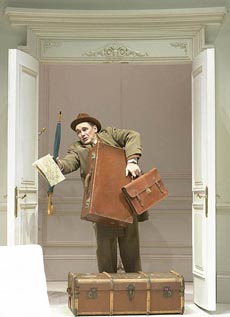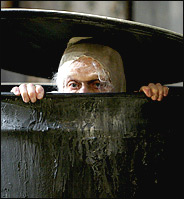The Broadway season ends tomorrow, and the openings have been coming so fast and furious in recent days that I’ve been forced to double up on this week’s Wall Street Journal drama columns. In today’s paper I review two very different shows, the Broadway revival of Boeing-Boeing and BAM Harvey’s production of Endgame. Here’s an excerpt.
* * *
 Let us now praise farce, the most ruthless form of comedy, in which a hubristically self-satisfied character (usually male) is faced with the prospect of imminent humiliation (usually sexual) and does all he can to avoid it, thereby making matters worse. I love farce, but for some reason New York producers steer clear of it, and it’s been some years since a slamming-door farce last played on Broadway. Now the drought is over: “Boeing-Boeing,” which was a hit in London last year, has crossed the Atlantic in time for this year’s Tony nominations, of which it will surely receive a hatful.
Let us now praise farce, the most ruthless form of comedy, in which a hubristically self-satisfied character (usually male) is faced with the prospect of imminent humiliation (usually sexual) and does all he can to avoid it, thereby making matters worse. I love farce, but for some reason New York producers steer clear of it, and it’s been some years since a slamming-door farce last played on Broadway. Now the drought is over: “Boeing-Boeing,” which was a hit in London last year, has crossed the Atlantic in time for this year’s Tony nominations, of which it will surely receive a hatful.
“Boeing-Boeing” is a seven-door farce set in the Paris bachelor pad of Bernard (Bradley Whitford), a businessman with three fiancées, all of them stewardessses. They’re never in town at the same time, which permits him to bed them seriatim. This being a farce, such well-laid plans are naturally predestined to collapse into a heap of smoking rubble. The dégringolade begins when Bernard’s mousy buddy Robert (Mark Rylance) drops by for a visit just as Fiancée No. 1, a cheerfully promiscuous New Yorker named Gloria (Kathryn Hahn), departs through Door No. 4, making way for Fiancée No. 2, a jealous Italian babe named Gabriella (Gina Gershon). Then Fiancée No. 3, a German giantess named Gretchen (Mary McCormack), shows up–her plane landed early–and within mere minutes things are way, way, way out of hand.
The plot of “Boeing-Boeing” is a skein of silliness and the characters ethnic cartoons, meaning that the show must be flawlessly cast and directed with ultra-finicky timing in order to work. The good news–make that great news–is that these conditions are seen and raised in Matthew Warchus’ staging. Top honors go to Mr. Rylance, a Shakespearean actor-director whose lunatic performance as Robert startled the hell out of the London critics. Imagine (if you can) a balding, adenoidal milksop with mismatched eyebrows who strolls into Bernard’s ménage à quatre, sees what he’s been missing and decides that the time has come for him to embrace the more abundant sexual life….
 The last time I saw “Endgame,” 9/11 loomed three years nearer in the rear-view mirror, which added an extra twist of relevance to Samuel Beckett’s post-apocalyptic 1957 comedy about four people who appear to be all alone in what is left of the world. I use the term “comedy” loosely, but much of “Endgame” really is supposed to be laughable–if grimly so–which is what gives the play its mordant punch.
The last time I saw “Endgame,” 9/11 loomed three years nearer in the rear-view mirror, which added an extra twist of relevance to Samuel Beckett’s post-apocalyptic 1957 comedy about four people who appear to be all alone in what is left of the world. I use the term “comedy” loosely, but much of “Endgame” really is supposed to be laughable–if grimly so–which is what gives the play its mordant punch.
Rightly or wrongly, though, New Yorkers are feeling rather less anxious these days, and I wonder whether that might explain why I found BAM Harvey’s star-studded new production of “Endgame” to be somewhat less compelling than the potent revival mounted by the Irish Repertory Theatre in 2005. Or perhaps the play itself isn’t quite as good as I once thought it was. Nobody ever accused Beckett of being obvious, but “Endgame,” much to my surprise, now seems to me to border on heavy-handedness in its portrayal of the dark encounter that awaits us all…
* * *
Read the whole thing here.
Archives for May 7, 2008
TT: MIA (cont’d)
At last, an Elaine Dundy obit–from England. (Arrgh.)
TT: Almanac
INTERVIEWER: You’ve said that one of the things you like about theater is that it’s a collaborative art and that you in a sense have a family. Again, to the layperson, it’s amazing, with all those people involved, that a musical ever gets on. In your experience as a collaborator in the process, when it works, what makes it successful?
SONDHEIM: The answer is so obvious that it will not seem like an answer. You have to be sure that you’re writing the same show. That’s something that I didn’t discover about [A Funny Thing Happened on the Way to the Forum] until too late. We weren’t writing the same show, even after we’d spent the better part of four years on it. They were writing a certain kind of show, and I was writing a certain kind of score, and none of us recognized that they were slightly different. I learned from that, and so the preliminary discussions for any show I do with my collaborators are to be sure that we’re writing the same show. That’s what makes it work.
Stephen Sondheim (quoted in Jackson R. Bryer and Richard A. Davison, The Art of the American Musical: Conversations with the Creators)
